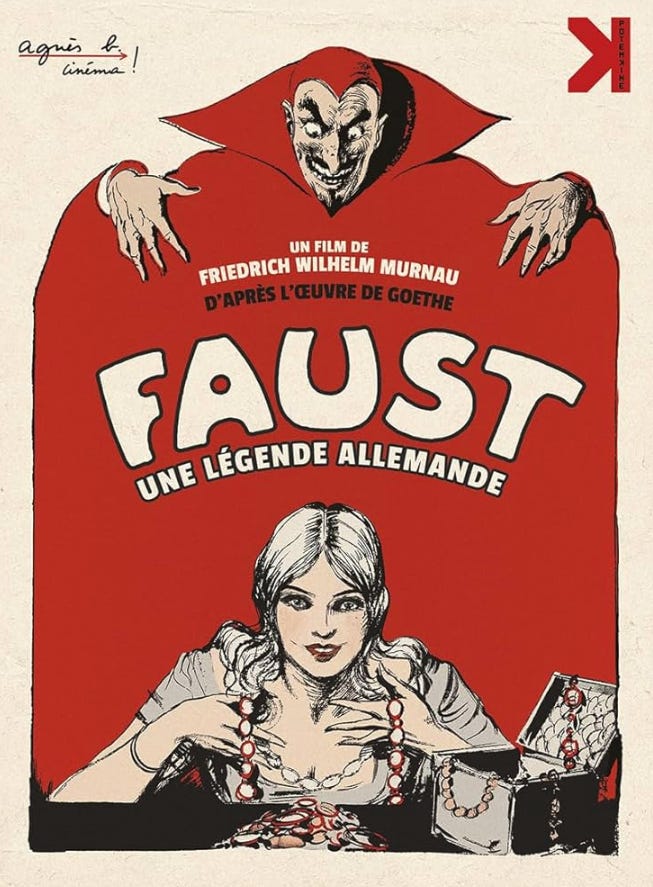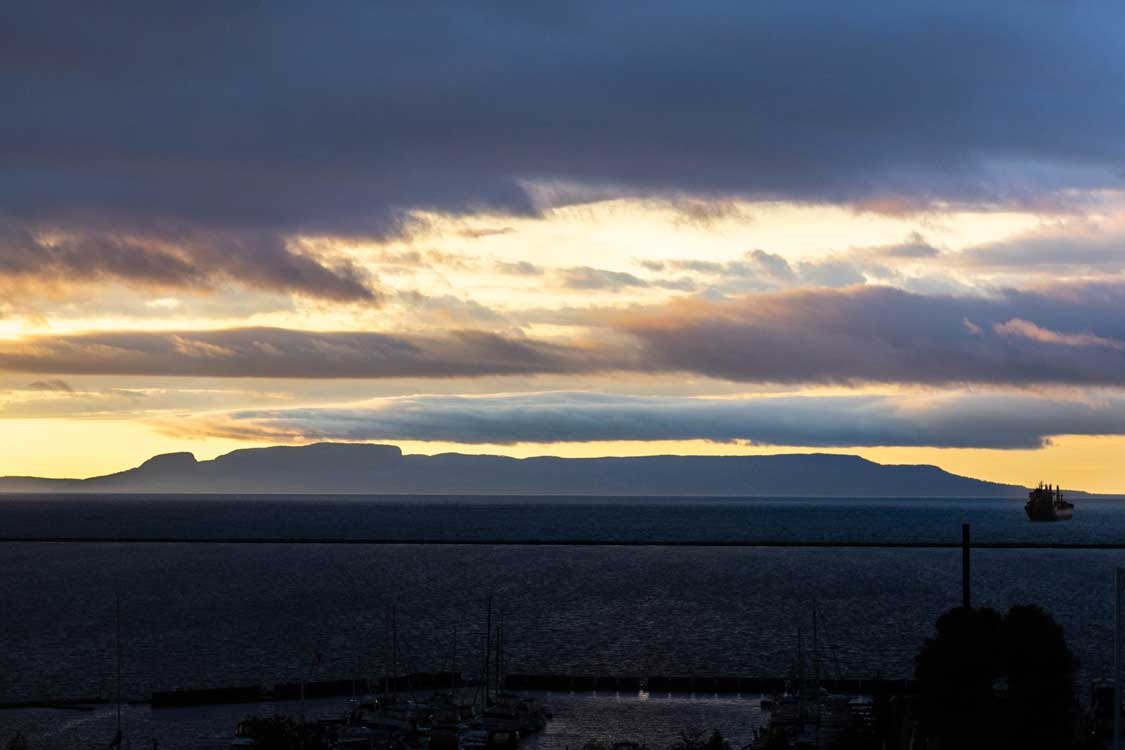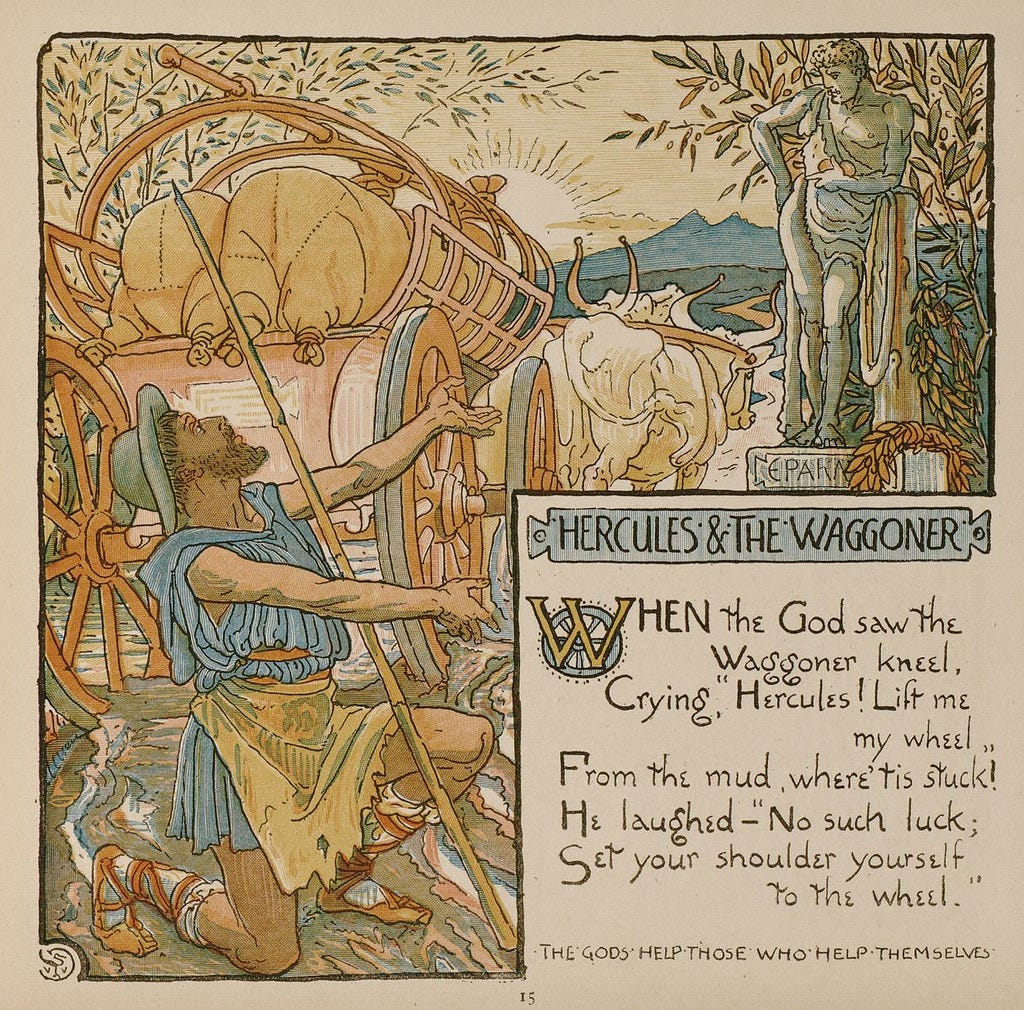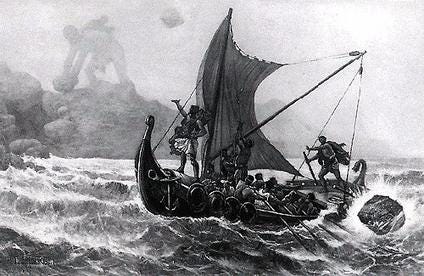Yes, I Really Believe in the Old Gods
One of the reoccurring critiques and challenges I get from Christians and others regarding Paganism is the accusation that I don’t “Really” believe in the Pagan Gods… that I believe or “believe” only as some calculated political/philosophical expedient or aesthetic choice and that really my professed “belief” is some sort of white or darker shade of lie or “LARP”, and that I must plainly KNOW that the Greek, Roman, Nordic, Celtic and other pantheons and only legends, mere mythologies, and cute stories…
I wish I could find it… but there was actually a twitter thread about a group of Christians and Jews responding with OUTRAGE when a group of academics, quite detachedly and seemingly meaning nothing by it, referred to Behemoth, Leviathan, the Flood, the Destruction of Sodom and Gomorrah, David’s defeat of Goliath, Adam and Eve, the Nephilim, the Plagues of Egypt, and Abraham and Issac as stories and figures of “Hebrew Mythology”.
“Mythology” to their mind was not a neutral term referring merely to cultural stories of a supernatural or historically unverifiable nature whose historicity, origin, and attachment to actual events cannot be verified to the standard of primary history— Stories of cultural import which may or may not be true or fictionalized to some extent we can’t differentiate (Imagine if Gone with the Wind was the last American book to survive and then arguing the Battle of Atlanta was fictional and never happened), the way Homer’s account of the sloped walls of Troy turned out to be shockingly accurate when Troy was found, whereas his accounts of Chariot warfare seemed to be confused by the subsequent 300 years without greeks employing chariot archers. Rather “Mythology” to their minds denotes FALSE STORIES. SUPERSTITIONS with no attachment to reality, and thus to refer to even the most fantastical and supernatural of biblical stories as events or aspects of “Hebrew Mythology” was to state the bible was false.
Troy, Gilgamesh, the Arthurian Legends, the Budha, the conquests of Mohammed, the war of the 3 Kingdoms, the Battle of Goths and Huns, the Haiwatha, the Wendigo, Quetzalcoatl (the God and the hypothesized historical ruler), the various unconfirmed Pharoah stories, the Mormon Corpus… THESE ARE MYTHOLOGY. Even the stuff that’s been archeologically confirmed. Our collection of of texts and books though… you can’t call that mythology. It’s the truth!
.
Ironically many of these same people within nearly the same breath that they accuse me of being a “LARPER” will also accuse me of making pacts with “Demons” and claim that the beings I believe in are in fact vastly more real than I can possibly comprehend and that I am playing with the most dangerous of hellfire… so pressingly REAL and dangerous are the Ancient “Gods” who are actually Satanic Demons in barely concealed disguise.
Somehow I am simultaneously a cringe 90s mall goth playing at witchcraft and also a Later-Day Faustus dealing in a damnable deadly game with the Devil himself.
.
“But do you actually believe in the Pagan Gods?”
Yes. Vastly more deeply and in more ways than the vast majority of Christian believe in their religion.
.
First things first, as to what I believe, I am a profound Compatiblist between the various Pagan traditions. Just as the Ancient Romans saw NO contradiction in Worshiping their city Gods and ancestral deities, drawing connection and integrating Greek mythology, cults, and tradition… Exploring various Egyptian and eastern Gods and cults such as Isis or Mithra, and integrating or continuing various Religious practices and traditions in their northern territories (such that various Celtic traditions transmitted and continued as folklore and religious belief in Gaul and Britain)… Likewise I see no contradiction in holding to both the Norse Pantheon, Hellenic Pantheons, Celtic mythologies, various “Cowboy Shintoist” myths and legends of the American Frontier, and Native mythologies that grant color to the land I live in.
One can see in Hellenic or Norse mythology the various developments, mergers, conquests and integrations of different pantheons over time… For the Norse Pantheon this is quite dramatic with the whole thing including separate pantheons of the Aesir and the Vanir who waged war before semi-merging almost certainly denoting an actual series of wars and cultural merging between various Northern tribes and ethnicities that resulted in the imperfectly merged traditions. Likewise in the Hellenic Tradition one can see Gods moving in and out of prominence or being stricken entirely from worship as the Titanomachy almost certainly attaches somehow to the fall of Mycenae or Crete and the arrrival of Dionisis or the Changing focus of Athena from War, Cunning, and Deception to Justice, Due Process, and Civil Administration denoting various political changes and cultural shifts.
Pagan beliefs and legends develop, shift, merge, and continue within Ethnicities, Cultures, Civil Traditions, and lands… communicating their mysteries and truths about individuals, histories, peoples, cultures, institutions, and territories to subsequent generations with ears to hear.
To look to Norse Paganism and Freyja or Odin to gain an understanding of your ethnicity, Hellenic Paganism to gain knowledge of the timeless truths of European civilization and Aristocracy, the Celtic Legends of Arthur to understand deep Anglo language, culture, and institutions, American Frontier and Cowboy/Country legends to understand a place in the new world and its mythical shinto-esque folkculture, and Native mythology of sleeping Giants and Wendigos to understand the land and its character… is not some ideosychratic schizo pastiche, it is relating to your ethnicity, culture, folkways, and lands exactly as your ancestors did… attaching significance to the mythologies and legends of each.
Indeed these traditions intersect more than you’d think… George Washington, the most diefied and mythologized of American presidents (such that several Japanese shrines litterally worship him as a shinto God) has been Genealogically documented as having descended from the Norse King/God Odin since the 19th century.
“So you’re just picking and choosing”
It is more apt to say Various Gods and traditions have chosen me. I did not choose to be a White North European descended from the believers of the Norse Gods, nor did I choose to be part of the western civilization created by the Hellenics, nor did I choose to be an English speaker with a culture infused with Celtic and Arthurian Legend, nor did I choose to be born in the North American Countryside with its frontier legends and folkways and mysterious native lands… Likewise many traditions have NOT chosen me, nor have I chosen. The Various Phonecian, Egyptian, and Persian Gods are complete irrelevancies to me as are the Aztecs Gods… The Japanese Shinto traditions matter to me largely only as a beautiful foreign curiosity and cultural export by which to contrast my traditions or to appreciate some cultural export… And the Hindu tradition not even that much.
“But do you believe in your Gods?”
Yes. Indeed I believe in them more deeply than I expect the vast majority of Christians, Jews, and Muslims believe in the Abrahamic God.
“No really, do you literally believe in them!?”
The word “Literally” is epistemically and culturally confused here, unlike the Creationist tradition of American Protestantism or many of the more credulous or fantastical traditions and superstitions of Islam… Maybe The most ridiculous of which is the habit of several tribes of Muslim to NOT AIM their rifles in battle… Instead praying and trusting to Allah to guide their bullet (combat being imagined as the setting in which miracles of pure faith and divine deliverance can occur… often with disasterous result). The Pagan Tradition has almost ALWAYS placed the Gods in a more abstract, mysterious, internal, psychological, and tempestuous/fortuitous position.
Whilst the wrath or fury of the Gods might take the form of storms, plagues, ill fortune, curses, etc. Seemingly 10 or 20 times removed from whatever action or proximate cause brought them about… Just as folly, ill decisions, and reckless risk taking inevitably catch up in unpredictable wildly destructive manners… The favour of the Gods comes invariably in the form efforts bearing fruit, good planning panning out, calculated risks paying off, and Judgement acting keenly and sharply.
Aesop’s Fables of Hercules and the Waggoner and Athena and the Shipwrecked Men illustrate this.
Hercules admonishes a stuck waggoner to use his own shoulder to unstuck his wagon, just as Athena instructs the drowning man to use his arms to swim to shore… The favour of the Gods not being found in a miraculous deliverance, but in the inner strength unlocked through will, effort, and faith.
Benjamin Franklin would revive and popularize this sentiment amongst 18th century Americans coining the modern phrasing “God helps those who help themselves”.
We can also see this in Homer where various prayers and entreaties are answered by some roundaoubt aiding of the suplicant to succeed in their own manner, whereas the judgement of the gods is often swift and merciless as the Thunderbolt…
.
But to answer the Question more thoroughly “Do you really believe in the Pagan Gods?” there are about 5ish ways I could see one believing in them.
Psychologically: That one believes the various Pagan traditions accurately capture a meaningful, useful, or healthily guiding description and aspiration for one’s own psychological state.
Abstractly: That the Gods accurately capture deep and detailed relationships between the concepts, abstractions, and domains they rule and that to believe and understand them is to understand the abstractions and concepts more clearly, meaningfully, and wisely… That Meditating on Athena will make one more cunning and effective in war, Contemplating Zeus will make one more kingly, puzzling over the mysteries of Freyja will make one more successful in romance, Studying Odin and the Havamal will make one more keen of judgement, daring, and danger…
Culturally: That the Gods accurately perserve and propogate healthy cultural beliefs, habits, behaviours, taboos, knowledge, will and forms that tie you to your ancestors and biological culture, prepare you for the adversities of life, and help you create stronger familial and kinship ties with which to combat your enemies.
Ancestrally/biologically: That the Gods are an Ancecstral Blood Memory. That one sees in the Gods the Ideals of one one could be, which one’s people have been selecting for and celebrating for millenia. That in the Gods one sees at once the collective memory of the greatest people of your ethnicity’s kings and Queens and great personages, who’s memories and great qualities have been absorbed into the greater memory of the Gods, and whose virtues and ideals proper worship exists to summon forth in current and future generations… At once Memory of past greatness, ideal to strive for, and future personages being summoned into reality. That the Gods are at once a biological memory of greatness past, a divine aspiration to the greatness one might be in this life, and ever improving and more impressive beings eternally being summoned from the future in the form of ever more impressive and divine children and future generations.
Supernaturally: That via mechanisms not apparent or seemingly contrary to established physics or otherwise magical or unknown, the Gods themselves might actually intervene or appear in your life either via supernatural premonitions or direct interventions or “magical” dealings.
.
I consider the first four to be simply obviously true to the point where “believing” as a matter of “faith” seems a complete misnomer compared to how obviously true and how basically non-existent an epistemic leap it is to believe them…
And as for the fifth “Do you really believe in the supernatural existence of the Gods?” the answer is almost entirely yes.
Do I have a deep rooted metaphysical justification or proposed mechanism for their existence as supenatural entities? Not really. But the word “Supernatural” already covers that such a mechanism is unknown, mysterious, or speculative… If all the mechanisms were understood it would not be metaphysical or supernatural… but physical and natural.
But when I meet a mysterious old man on the road who’s obviously committed extreme violence in his day, and he points out that some part of my motorcycle that could catastrophically fail at 70 miles per hour… or I meet an austere woman who warns me of some danger on the road… or I look over at my portrait of Athena on a long night of work when I’ve had some unique inspiration and her eyes seem to be blazing… or I have a vision on the edge of sleep of some ghostly drowned corpse crawling out of a lake I’ve camped next to and up to my hamock to whisper horrifying secrets in my ear prophesizing some doom as I drift on the edge of sleep and waking…
The doom she prophesized was true… I crashed my motorcycle within the week, though when I woke I could not remember a word she had said.
Sure there is a normal explanation… maybe it was just a guy, maybe it was just a woman, maybe the lighting was good on the portrait that night, maybe it was just a bone chilling nightmare…
But I believe it… sometimes I have doubts like any faith… And other times I believe it quite violently and involuntarily recoiling almost in terror… And other times I have but some sense of wonder and mystery, like when the wise old biker having saved my life disappears down the road whilst I was looking the other way, or a Snowy Owl descends from a branch and crests the wind a mere foot from where I’m riding….

But from the subjective perspective, belief is belief… One is not recoilling in horror at the idea of a physchological event or nightmare, or wondering at the mystery of a mere sense of timeless continuity.
Nor would one want to… This sense of thinking, this mode of belief and “faith” is not just aesthetically and spiritually compelling it is ADAPTIVE…
There is a reason every warrior elite in western history found the Iliad, Odessey, Sagas and Legends of King Arthur compelling, and it’s because, even when they worshiped very different Gods, the state of relation to the world, wondering at the Homeric mystery, spiritual oddities, ghosts, gods, witches, monsters, etc. Whether they be Actual, spirtitual, metaphorical, or analogous… that pattern of relating to the world, Natural and vast expanding… That’s timelessly relevant to actually going out and DOING THINGS.
Not monotheistic Deontological preening and anxiety about doing what is right or seeking anxious perfection in one’s personal conduct, but actually exercising judgement which is one’s own, not falling into rules. Developing and trusting personal instincts and intuitions removed from the ethical hand wringing that would tell you that how you speak to a man or woman you’ve never met and is acting strangely is somehow a great ethical trial of your worth and character, as opposed to a hazard/opportunity… or that somehow how you respond to an insult or threat is supposed to be some venue for introspection and personal spiritual interrogation, instead of a matter of honor in which you must defend yourself.
The life, adventures, dangers, and rewards of a Greek Hero, Norse Warrior, or Arthurian Knight are all RIGHT THERE… Right outside your door, just up the path where the road becomes treacherous, the people unknown, the bars and trees ever so slightly shady… the night ever so slightly demanding that you carry a knife or gun…
And inspite of 3000 years the Ancient logic and instincts the part of your brain telling you there are monsters, witches, and Gods out there… inspite of a culture that exists to train you to desmiss these deepest instincts and sense of possibility… you’ll meet these figures and need those instincts damned fast when you’re off on your own.
This is how your mind is adapted to work and these are the stories, legends, patterns, eternal truths, and ancient allies your deepest ancestors and culture exists to train you to recognize and understand.
Homeric Greece or the Sagas North isn’t some barely remembered ghost of the past… It isn’t even past.
The Oddesey and the Havamal are as relevant today as when they were written… maybe moreso.
Tip:
BITCOIN: bc1qdhj7637sgcssxgxygjaa3ddljwy8tzg5mzw325
MONERO: 8AhA3g9hbtDcAJE5MPmeQsFwwGsf3H9fq9tC6giQ4a6vKnTXv4J4MivKXrPKDpXyEeNc9mfFejbq84kSWkC8pjuj18rAEij
Follow me on Twitter: @FromKulak











"every warrior elite in western history found the Iliad, Odessey, Sagas and Legends of King Arthur compelling"
Maybe they did, but a lot of them were *also* Christian
Hail Our Ancestors!
Hail Our Gods!
Let us be as Mighty and find the Glory they found! ⚡️